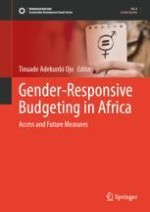2024 | OriginalPaper | Chapter
3. Gender-Responsive Budgeting in Climate Change Financing: A Panacea for Confronting Climate Change Vulnerability in South Africa?
Authors : Nqobile Sikhosana, Ogochukwu Nzewi, Mpumelelo Ndlovu, Wayne Malinga
Published in: Gender-Responsive Budgeting in Africa
Publisher: Springer Nature Switzerland
Activate our intelligent search to find suitable subject content or patents.
Select sections of text to find matching patents with Artificial Intelligence. powered by
Select sections of text to find additional relevant content using AI-assisted search. powered by
